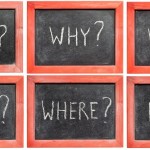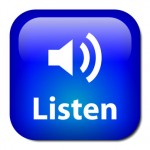Today’s post is brought to you by Lance Wiles. Lance is a new contributor to AG and I’m very thankful that he’s decided to lend a hand to help our community. — Paul Dooley
When it comes to anxiety and panic, nutrition is just as important as any other coping mechanism. There are literally hundreds, if not thousands, of different views on diet and nutrition, and almost as many on supplements, medicines, and homeopathic treatments. What I will not do here, is dig into the basics of a well rounded diet.
The first step in determining what is the right path toward proper nutrition is to make sure that you have worked with your health-care provider to make sure that you do not have one of the following conditions(not all inclusive:)
- Any food allergies or intolerance
- Heart Conditions
- Diabetes
- Metabolic Disorders
After making sure that these conditions are not the reason for your anxiety and panic, you can start to develop some healthy nutritional/lifestyle habits, such as:
- Stop the use of all Tobacco Products
- Reduce your intake of refined sugar
- Avoid or Reduce Coffee intake
- Avoid or Reduce Soda consumption
- Avoid or Reduce Chocolate intake
- Avoid or Reduce White Bread intake
- Avoid or Reduce White Rice intake
- Avoid or Reduce Alcohol consumption
Developing a Healthy Nutrition Regime
We live in a fast paced society. There are fast food restaurants by the hundreds in almost every city. This in and of itself can and does tend to lead us to having a poor diet. It is almost unavoidable that we fall into the fast food trap.
Replacing well balanced meals with meals that are carbohydrate heavy is the trap of our fast food nation. Carbohydrates are the trap that can cause us to get into a cycle of anxiety and panic because as they are metabolized by the body they turn into sugar.
Excessive sugar levels can contribute to the production of chemicals that are known to induce anxiety, and this can sometimes trigger panic attacks. This is one way that panic and anxiety can be triggered, it’s not only by a certain situations, but also because of the food we eat.
A healthy diet that leads to a calmer you will look something like this:
- 25% of meat, poultry, seafood (salmon, swordfish, tuna, clams, crab, mussels, and oyster), and products made from soybeans like tofu, eggs, and cheese.
- 30-35% percent of baked potato, broccoli, asparagus, peanuts, legumes, watermelon, and oranges.
- 40-45% of brown rice, whole grain cereal, pasta, wheat germ, oatmeal, and rye bread.
The above menu is filled with food rich in B vitamins, which can and will help (through the maintenance of a well-balanced nutrition regimen) reduce panic attacks and general feelings of anxiety.
Ultimately, balance should be your goal. But what is important in establishing balance is that you eat your meals at regular times. This cannot be stressed enough. Your body is a fine tuned machine and while there maybe certain conditions that can cause brain “misfires,” there are steps YOU can take to reduce the misfires and hopefully reduce the number of anxiety filled days.
I have never personally been one to eat breakfast. It was never an important meal to me, but every nutritionist and dietitian that I spoke to in preparing this article was clear that breakfast is important. In addition, it’s well known that 4 small meals a day, as opposed to 3 big meals, lends itself towards a healthier balance. It’s also important to note that your largest meal should be eaten at lunch.
A good example of what a 4 small meal a day routine would look like is this:
Breakfast 6:00AM – 8:00AM
Mid Morning Meal 10:00AM – 12:00PM
Mid Afternoon Meal 2:00PM – 4:00PM
Evening Meal 6:00PM – 8:00PM
Most nutritionist and dietitians I spoke with agree that the Evening Meal should be COMPLETED by 8:00PM. Do not eat a heavy meal after 8:00PM as this will disrupt your sleep cycle. However, this recommendation is for people that work a regular 8:00 – 5:00 schedule. It would need to be adjusted for someone that does shift work.
COMING IN THE NEXT ARTICLE – SPECIAL CASES: ANXIETY AND PANIC, DIABETES DIET, AND A SPECIAL WARNING ABOUT PRESCRIPTION MEDS AND THE SELF ADMINISTRATION OF NUTRITIONAL SUPPLEMENTS AND HOMEOPATHIC REMEDIES.





Nice article, Lance. Good to see another contributor here. Nutrition and exercise are routinely overlooked by sufferers, in my opinion. Both build not only physical stamina and health… but confidence, as well.
I agree Bryan, I also think that we all tend to forget about the basic stuff that can really help reduce anxiety, and what’s more basic than food!
I’m on a healthy diet, water, and the suppliments I take are a good multivitamin, 250mg of vitamin C, 100 mg of magnesium, 50 mg of B3 (100mg also works well), and occassionaly a holy basil suppliment. I’m sensitive so for me this is a good way to go. I found 250mg of magnesium was making me more anxious and had to cut it back to 100mg.
@ageofknowledge: that’s interesting. I took magnesium for a year or two, and had gradually increased the dose (up to about 400, which was prescribed by my neurologist for migraines). But at the higher doses, it didn’t seem to be working the way it “should” – maybe I should try again, sticking at around 100….
But I loved this article! I can’t wait for the next one.
Great article, I believe that lifestyle factors are really important in managing anxiety. I’ve had quite a bit of success with exercise and relaxation techniques. After reading this I am keen to turn my attention to my diet as I suspect that my love of carbs isn’t doing me any favours. Thanks for the great info, really helpful and practical.